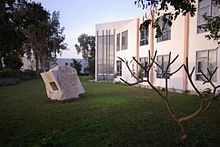Heliopolis University
The Heliopolis University is an institution of private higher education based in Cairo's Heliopolis district. According to its founders (including Ibrahim Abouleish ), the educational institution is one of the first institutions in the world to focus exclusively on promoting sustainability through tertiary education. The motto of the university is: "Sustainability, freedom, solidarity and responsibility." Heliopolis University is a member of the University Chair of Innovation network, which links industrial companies and universities to solve industrial problems through applied research.
history
The university was opened in 2012 and founded by the Egyptian SEKEM initiative, a not-for-profit, non-profit organization with the aim of promoting human development in Egypt and the Arab region in a holistic way. The facility also sees itself as not-for-profit. It operates numerous exemplary model projects such as B. its own biological sewage treatment plant, a photovoltaic system for power supply and a botanical garden. It is characterized, among other things, by the fact that all students are required to complete a one-year general course with courses in art, social science, nature and community, as well as languages.
All degrees offered are based on the Credit Hour System and are accredited by the Egyptian Ministry of Education; they can be transferred to the European Credit Transfer System (ECTS).
The course is currently (January 2014) supported by around 20% through grants.
Self-image
The facility bases its work on the four assumptions that:
- All human resources - water, energy, food - are limited and that the future needs people who think sustainably and responsibly in order to preserve the resources for future generations,
- creative and innovative leaders with new ideas are necessary to tackle current and future challenges,
- Teamwork and collaboration are key elements for a sustainable future for all people,
- Theory and practice must be united in order to change the world.
Faculties
In its first phase starting in 2012, the Heliopolis University will initially offer three faculties, all of which should play an essential role in sustainable development: new models in business and business, new technical solutions, and holistic healthcare.
Faculty of Management and Economics
Departments
- marketing
- accounting
- economy
- Finances
- management
degrees
The university awards the BA in Business and Economics.
Academic program
- 4-year course
- Constructive compilation of courses from all five subject areas
- Two internships
- Research group project innovation
- Thesis
engineering
Departments
- Energy Technology
- Water technology
- Mechatronics
degrees
The Heliopolis University awards the degrees
- B.Sc. Energy engineering,
- B.Sc. Water engineering,
- B.Sc. Mechatronics,
Academic program
- 5-year course consisting of general studies and specialist studies
- 2 practical training phases
- Final project in the fifth year
pharmacy
Departments
- Pharmacognosy and microbiology
- Pharmaceutical chemistry
- Pharmacology and biochemistry
- Pharmacy and pharmaceutical technology
- Pharmacy practice
graduation
The faculty awards the degree of Bachelor in Pharmacy.
Academic program
- 5-year course consisting of general studies and specialist studies
- 1 year with an elective focus
- Final thesis in the fifth year
Studium Generale
The general studies should, according to the organizers of the "individual creativity of the students wake up": "The ability to teamwork and the ability to innovate develop a sense of social responsibility and the desire to serve society the Studium Generale transformed old ways of thinking in creative actions.. The head, heart and hands are involved in the exercises. Self-reflection and self-portrayal increase the self-confidence of the students. At their later job they will be equipped with the necessary ability to solve problems. "
The Studium generale is also intended to motivate lifelong learning. The ability to perceive oneself and the world with "alert awareness" as well as "empathy for the challenges of professional life" should be promoted.
The Studium generale comprises four course cycles:
- Art: deepening of personal development through music, acting and speech formation, eurythmy and fine arts.
- Social science: expanding knowledge through knowledge of politics, human rights and social research.
- Nature and community: creating a balance between inner and outer nature through the discovery of deep ecology, philosophy and psychology.
- Languages: Understanding cultures by learning English, German, Arabic.
The Studium generale is an integral part of all courses with 15%. It includes courses on nature and society, social behavior and on the acquisition of permanent learning skills in the linguistic and artistic fields. The main share (85%) are specialized courses. They include the areas of sustainable development and corporate governance, social economy, quantitative methodology, human development and developments that go beyond pure modernization. Furthermore, the students take a significant number of courses from their chosen major and minor subjects (marketing, accounting, economics, finance, management). In these courses, the demands increase as the degree progresses.
Center for Social Innovation
The center for social innovation should design and control "the exchange processes within the university". Its main task should therefore be to promote the connection between Studium Generale and the specialist sciences. It promotes curriculum design and ensures "an atmosphere of sustainable development and academic quality," according to the organizers. While the faculties are researching in their specialist areas, the aim of the Center for Social Innovation is to "bring these research projects together and integrate them into a humanistic context".
Web links
- Website of the Heliopolis University (English)
Individual evidence
- ↑ Prof. Dr. Ibrahim Abouleish - SEKEM. In: www.baumev.de. Retrieved June 5, 2015 .
- ↑ a b c d e f Brochure of the Heliopolis University (German), 2013 edition
- ↑ SEKEM - founder Ibrahim Abouleish visits the KUG. In: Press release from the Kunst Uni Graz. Retrieved June 5, 2015 .
